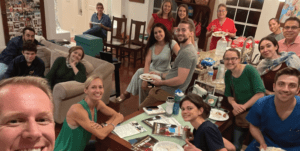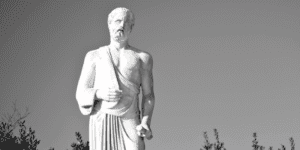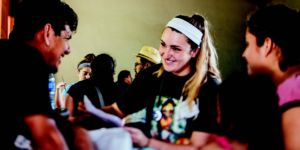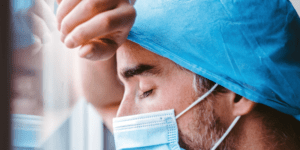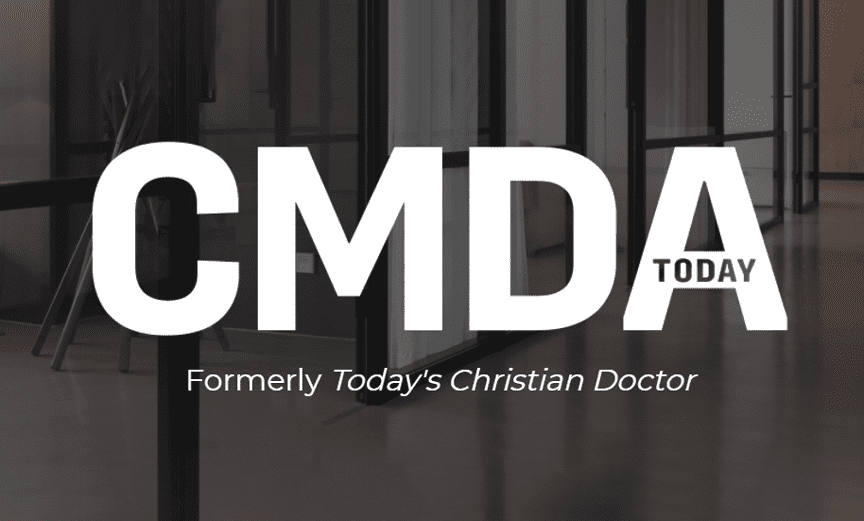
Staying Connected During School When Chaos and Isolation Abound
Sent home, shut in isolation, studying in our bedrooms, trying to survive our first year of medical school, and we weren’t even at school! When the four of us entered medical school in the Detroit, Michigan area in fall of 2020, it certainly trumped any expectations we had.
Megan Moore, Sarah Toates, Joseph Salib and Keaton Schmitz
Sent home, shut in isolation, studying in our bedrooms, trying to survive our first year of medical school, and we weren’t even at school! When the four of us entered medical school in the Detroit, Michigan area in fall of 2020, it certainly trumped any expectations we had. The world was in the midst of the COVID-19 pandemic, and our medical careers began in relative isolation—without live lectures, anatomy labs or other activities. In light of our chaotic and lonely existence as medical students in a non-social, non-functioning university, we were forced to find and create our own community, church, friendships, leadership, safe circles, mentors, etc. Initially, the only connection we had was CMDA. “The (CMDA) weekly (Zoom) Bible studies were the only time I regularly interacted with others,” explained one student. Through the weekly meetings, we found fellowship, friends and encouragement.
In addition, the students point out, “The CMDA upperclassmen have been a huge help and guidance for us throughout medical school. Not only can we ask for tips about courses or classwork, but we can also ask about the tough questions or ethical dilemmas we may face with classmates.” As we became more involved with CMDA and connected with other CMDA students and leaders, the more we found friendships, partners in education and common interests and experiences with others—including a friendship among the four of us. At the end of our first year, all of us were selected to serve as CMDA student state representatives, and although we come from a variety of faith backgrounds (Catholic, Egyptian Coptic and non-denominational), we all shared the common goal of finding ways to glorify God throughout medical school. “My co-leaders this year were the only safe space I felt I had in medical school to discuss my beliefs without feeling judged. We were able to talk about issues like the overturn of Roe v. Wade or dealing with LGBTQ patients from a biblical perspective,” one student reveals. What a blessing we all have been, and still are, to each other.
When we began as new CMDA student representatives in April 2021, the world was constantly in flux as we were going through another COVID-19 surge. Three out of four of us did get COVID, but, fortunately, we all had mild symptoms. For the remainder of the school year, we continued with online Bible studies with each of us choosing a Bible passage that was on our hearts. For example, mentions a student, “One of my favorite Bible verses is Philippians 1:6, ‘Being confident of this, that he who began a good work in you will carry it on to completion until the day of Christ Jesus.’ This verse is actually my screensaver on my phone, because it relays such an important message to all of us believers.”
Then, over the summer, we worked closely with CMDA Detroit Area Director John Bayon to brainstorm ways to expand CMDA’s mission on our campus. Following are some of the projects we worked on during our time in CMDA leadership, and also those we would recommend to other CMDA school chapters, both new and established.
Connecting with CMDA National
Amid medical school and running an on-campus organization, sometimes it’s easy to forget our student membership in CMDA also connects us with the CMDA national organization and its numerous resources for healthcare professionals. Through it, we gained mentors, accessed study resources and attended conferences—all devoted to building our faith. In the fall, Megan and Joe even had the opportunity to meet with CMDA CEO Dr. Mike Chupp and Vice President of Dental Ministries Dr. Bill Griffin when they visited Detroit. We had the opportunity to hear from them and ask questions, as well as interact with student leaders from other locations and share about activities afoot in our chapter. In addition, we attended multiple Midwest Student Leader Training sessions and met student leaders from around the region.
Through Women Physicians and Dentists in Christ (WPDC), CMDA’s group for women in healthcare, several of us have been paired with mentors. One of us, for example, has been meeting with her mentor weekly to read through a Christian book, discuss the intersection of faith and medicine and pray together. We have found that reaching out to mentors who understand what it means to be a Christian in healthcare has helped us feel connected to a larger body of believers and to CMDA, in particular.
Recruiting New Members
In the fall, we started off with a lunch meet up and large picnic to attract new students. We shared a group chat with the incoming students and invited anyone who was a Christian, or interested in the Christian faith, to join us. Additionally, we compiled a list of local churches attended by existing students and encouraged students new to the area to attend services together, as well as making public online posts. A particularly effective process for us was reaching out to students individually who were known to have Christian backgrounds. Who wouldn’t want a personal invitation? In our school’s Big-Little Sibling program, in which we all participated, we emphasized our faith and requested our mentees come from similar backgrounds. At this point, we have several “generations” of matches throughout all four classes of Christian students who have encouraged one another through medical school.
Prioritizing Intentional Community
The cornerstone of our chapter was our weekly Bible studies. In the fall semester, we based our study on Progress Notes by Jane Goleman, MD, which was recommended on the CMDA website. Every week, each of us took turns leading a chapter with the pre-written reflections and discussion questions. In the winter, we decided to use CMDA’s Faith Prescriptions on-demand video series to guide our studies; they were so encouraging. We received a great response from students. These videos provided an excellent launching pad for discussion on a variety of topics, including why spiritual care is important to patients, how to assess spiritual history compassionately and effectively and how to integrate faith and healthcare—topics which participants admitted they had not thought about. We chose the preclinical years to explore these topics, as students then have time to develop their perspectives on approaching healthcare before they see actual patients during clinicals. Although each of us had busy schedules, as leaders, we emphasized maintaining these weekly meetings regardless of exams or other commitments, recognizing that meeting consistently was important for our school and our fellow classmates. Thirty minutes was the ideal amount of time for these meetings, allowing enough time for productive discussion but not too much for a weekly commitment.
Exploring Key Topics from a Christian Perspective
Our key event held in the fall was our Conscientious Objection and Faith Panel featuring five physicians from various backgrounds. The idea came about after a controversial conscientious objection session during our ethics course. We hoped to show students their beliefs can be respected and upheld. Our panel included healthcare professionals from different specialties and religions. The uniqueness of this event even drew students who weren’t Christians but had an interest in ethics.
Each semester, we had physician visitors, an OB/Gyn and a psychiatrist, who spoke about practicing healthcare as Christian physicians. Students asked them questions like, “How do we think about the role of prayer and spiritual community when treating patients?” and “How has your personal Christian faith shaped your medical practice?”—questions students otherwise may never have the opportunity to ask.
Developing Local CMDA Community
When COVID-19 guidelines finally subsided, we held a wrap-up gathering and invited both local physicians and some of our third-year classmates to speak to the group. These seasoned mentors shared different aspects of their own experiences, including how they incorporate prayer into their busy, day-to-day lives. We also used the event to encourage the rising second-year class to apply to serve as CMDA student state representatives next year.
Growing in Our Personal Faith
CMDA leadership enabled us to serve both our classmates and, by extension, their future patients, as we fostered growth in their faith. Both planning and attending the weekly meetings and special events also helped us be accountable in our own faith. When life challenged each of us, our leadership commitments to CMDA reminded us of who and what really matters. It was also comforting to have a built-in faith resource, as we could always lean on each other for questions we had regarding our faith, as well as its application to our shared professional calling.
“CMDA has been a huge blessing in my life. Shortly into my first year of medical school, I unexpectedly found myself becoming a patient. The only way for me to cope has been through the lens of my faith. The friends and community I made in CMDA were critical for me to have a safe space to discuss the challenges I was facing and give me the hope I needed when times were tough. Even when my faith wavered, regular meetings always helped bring me back to Him—once again allowing me to lean into His love and saving grace,” one student shares from the heart.
Passing the Torch
After completing the application and election process for the next group of student leaders, the four of us left for our Step 1 study period, then for our clinical clerkships. It’s both exciting and bittersweet to pass on our school’s CMDA chapter to a new set of leaders. While all four of us were involved with multiple organizations at our medical school, CMDA played a unique role in our preclinical years because of the close community and friendships it helped us form. As we head into our third-year rotations, our hope is to carry some of that with us and put the lessons we learned into practice as we begin caring for patients.
A student reflects, “CMDA has instilled in me a newfound appreciation for the goodness of God in my life and a true appreciation for His grace in my life when I don’t want to give any grace to myself. I am truly thankful for all the amazing Bible studies and events CMDA has offered us medical students over the past few years and I am thrilled to continue to participate as a proud CMDA member for years to come!”
Reflecting On Our Experiences
Each of us has a unique story, molded and designed by our Lord and Savior—one of success, defeat, happiness and sorrow—which we hope to see through to the end. However, the constant that always remains is the presence of our Lord Jesus Christ. Often healthcare students, including us, have a habit of relying on themselves, partially because they feel they are smart enough and strong enough and partially as a consequence of the teachings of this world. Medical school has undoubtedly and drastically changed our perspective about whom we rely on and why.
Each of us came to a point in the last two years where it felt impossible to take another step, where adding just one more weight to our worries would cause us to crumble. We learned that even when we hit rock bottom, we know on which Rock we’re landing, “… I am placing a foundation stone in Jerusalem, a firm and tested stone. It is a precious cornerstone that is safe to build on. Whoever believes need never be shaken” (Isaiah 28:16, NLT). During the last two years, we each were able to experience the wonders of Christianity despite having less time, and now we are much more passionate about our faith. “CMDA helped me grow into leadership as a future Christian physician and forced me to think critically about how to live out my faith in this profession,” one explains.
We pray the ministry of CMDA continues to nourish and fulfill both its healthcare professionals and students all over the world.
As an inspirational sidenote to a dreadful couple of years, Sarah Toates was just married recently, and many were able to gather for it and share the experience with their good friend. God is good!
Get Involved
For any healthcare student—pandemic or not—these are great suggestions for ways to connect and participate with your local CMDA school chapter. So, get involved today! Visit ccm.cmda.org.
About the Authors
Megan Moore, Sarah Toates, Joseph Salib and Keaton Schmitz are all third-year medical students at Oakland University William Beaumont School of Medicine in Auburn Hills, Michigan near Detroit. All hail from the midwest and chose to attend medical school there, as well. The four students joined their school’s CMDA chapter in their first year of medical school and served as student leaders during their second year. Though they have not yet begun rotations, they’re interested in a variety of fields from internal medicine to OB/Gyn. Several have participated in medical mission trips through their school or church. They look forward to continuing their involvement in CMDA throughout the rest of medical school and into their careers as physicians.
This Feature Story Appears in:
Other Recent CMDA Today Articles:
- « Previous
- 1
- …
- 3
- 4
- 5

